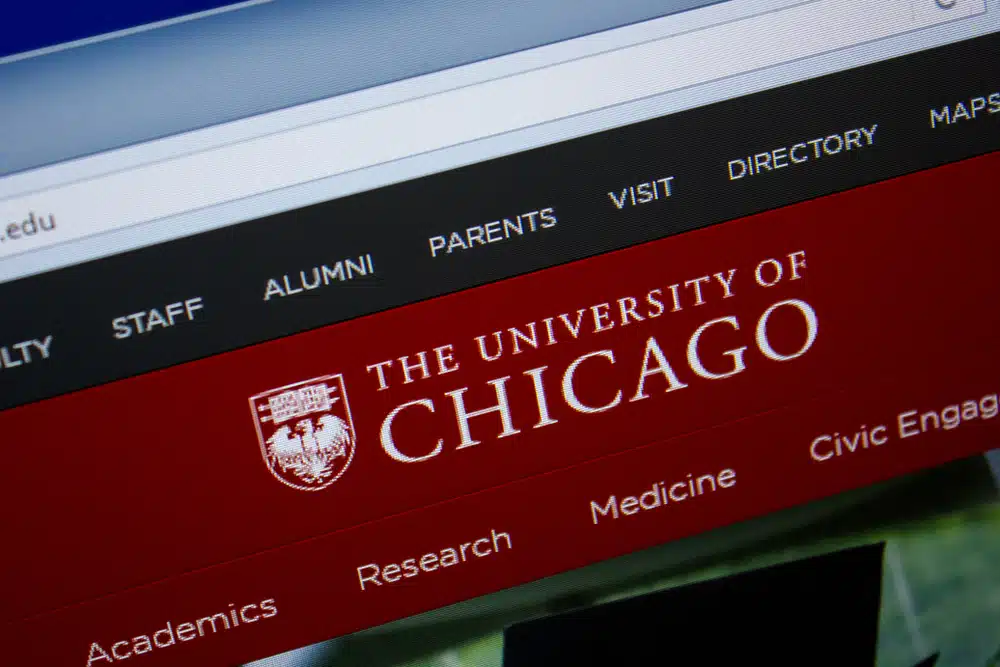Entering the world of higher education is an exciting time marked by fresh experiences and new challenges. A critical part of this journey involves choosing where to spend the next four years of our life. One institution renowned for its rigorous academic environment and rewarding educational experience is the University of Chicago. This article discusses the UChicago class of 2025’s statistics and many more!
Admission Trends for the Class of 2025
Understanding admission trends can provide invaluable insights into what each incoming class looks like. It also offers a glimpse into what makes an application competitive. The UChicago’s Class of 2025 admission statistics testify to the university’s appeal nationwide and worldwide.
When analyzing the admission trends for the Class of 2025, it becomes evident that the University of Chicago continues to attract a diverse pool of talented high school seniors. The university’s rigorous academic programs, renowned faculty, and vibrant campus community have undoubtedly contributed to its magnetic draw among prospective students.
The Early Decision cycle for the Class of 2025 marked a significant increase in applications, showcasing the growing interest in the University of Chicago. This surge in Early Decision applications reflects students’ confidence in the university’s ability to provide an exceptional education and transformative experiences. The university’s commitment to fostering intellectual curiosity and critical thinking skills resonates with applicants, making it a highly competitive process.
Figures for the Regular Decision cycle were just as impressive, further solidifying the University of Chicago’s reputation as a top-tier institution. The university’s holistic admissions approach ensures that each application is thoroughly reviewed, considering not only academic achievements but also extracurricular involvements, personal essays, and letters of recommendation. This comprehensive evaluation process allows the university to select a diverse and talented group of students who will contribute to the vibrant intellectual community on campus.
UChicago Class of 2025 Statistics
The UChicago acceptance rate for the class of 2025 was highly competitive, with an admission rate of only 2.1%, admitting approximately 2,460 students out of 37,986 applicants. The class of 2025 at the University of Chicago had a distribution of 53% men.
Breakdown by In-State and Out-of-State Admissions
A University of Chicago education is sought after by students from all fifty states. The breakdown of in-state versus out-of-state admissions for the Class of 2025 demonstrated a balanced distribution indicative of the University of Chicago’s national standing. This diversity of geographic representation enriches the educational experience for all students, as it fosters a valuable exchange of perspectives and ideas.
Students from in-state benefit from the university’s proximity, allowing them to fully immerse themselves in the vibrant campus life while maintaining connections to their local communities. On the other hand, out-of-state students bring unique perspectives and experiences, contributing to the university’s multicultural environment. The University of Chicago’s commitment to fostering a diverse and inclusive community is evident in its admissions practices, ensuring that students from all backgrounds have the opportunity to thrive academically and personally.
Furthermore, the university’s strong reputation and global recognition attract many international students. The UChicago Class of 2025 statistics saw a notable increase in international admissions, highlighting the university’s appeal beyond national borders. This international representation enhances the cultural diversity on campus and exposes students to a global perspective, preparing them to become global citizens in an increasingly interconnected world.
In conclusion, the admission trends for the University of Chicago’s Class of 2025 reflect the university’s continued excellence and appeal among high school seniors. The increase in applications, both in the Early Decision and Regular Decision cycles, demonstrates the university’s strong reputation and the value students place on a University of Chicago education. The balanced distribution of in-state and out-of-state admissions and the growing number of international students further contribute to the university’s diverse and vibrant community. As the Class of 2025 embarks on their academic journey at the University of Chicago, they join a community of scholars and innovators dedicated to positively impacting the world.
Academic Profile of Admitted Students
The academic caliber of admitted students speaks volumes about the University of Chicago’s commitment to intellectual excellence. From standardized test scores to high school GPAs, the academic profile of the Class of 2025 reflects the university’s rigorous academic standards.
Admitted students at the University of Chicago are known for their exceptional academic achievements. They have demonstrated a strong commitment to learning, intellectual curiosity, and a passion for knowledge. The university takes pride in attracting students who are not only academically talented but also have a genuine thirst for intellectual exploration.
One of the key indicators of academic prowess among admitted students is their performance on standardized tests. Most admitted students boasted competitive SAT and ACT scores, with the middle 50% range well above the national average. This reinforces the University of Chicago’s reputation for academic rigor and its commitment to attracting high-achieving students from across the globe.
High school GPA is another important factor in evaluating the academic profile of admitted students. The high school GPAs of the Class of 2025 exemplify the school’s high academic expectations. Admitted students have consistently demonstrated exceptional academic performance throughout high school, showcasing their dedication to their studies and ability to excel in a challenging academic environment.
At the University of Chicago, academic achievement is not just about grades and test scores. It is about fostering a love for learning, critical thinking, and intellectual engagement. Admitted students are not only academically talented but also possess a wide range of interests and a desire to impact the world through their education positively.
In addition to their academic achievements, admitted students at the University of Chicago are known for their intellectual curiosity and eagerness to explore diverse fields of knowledge. They embrace interdisciplinary studies, seeking to connect different areas of study and gain a holistic understanding of the world.
Overall, the academic profile of admitted students at the University of Chicago is a testament to the institution’s unwavering commitment to intellectual excellence. It is a place where students are challenged, inspired, and encouraged to reach their full academic potential. The university takes pride in attracting and nurturing the brightest minds, creating a vibrant and intellectually stimulating community.
Diversity in the Class of 2025
At the heart of the University of Chicago’s ethos is the belief that diversity enhances the learning environment. The UChicago Class of 2025 statistics were among the most racially and ethnically diverse in the university’s history.
The University of Chicago prides itself on fostering an inclusive and diverse community, recognizing that a diverse student body brings a wealth of experiences, perspectives, and ideas to the table. The Class of 2025 exemplified this diversity commitment, with students from various ethnic and racial backgrounds.
Within the Class of 2025, there was a vibrant tapestry of cultures and traditions. Students hailed from various ethnic groups, including but not limited to African American, Asian American, Hispanic/Latinx, Native American, and Pacific Islander. This rich diversity reflects the broader society and creates a dynamic learning environment where students can engage in meaningful discussions and learn from one another’s unique experiences.
Ethnic and Racial Representation
The admitted Class of 2025 hosted various ethnic and racial backgrounds. This variety augments the learning experience at the University of Chicago by encouraging students to view problems from a multitude of angles and to understand different cultural perspectives.
Students from different ethnic and racial backgrounds bring their distinct histories, traditions, and ways of thinking. This diversity of thought and perspective fosters a more comprehensive understanding of complex issues and promotes critical thinking skills. It allows students to challenge their assumptions and broaden their worldview.
Furthermore, the University of Chicago is committed to creating an inclusive and supportive environment for all students. The university provides resources and support systems to ensure students from diverse backgrounds feel valued and empowered. This commitment to inclusivity extends beyond the classroom, creating a campus culture that celebrates diversity and promotes mutual respect.
International Student Statistics
As a testament to its global reach, the University of Chicago’s Class of 2025 included students from more than 90 different countries. This enriches the intellectual life on campus and expands the university’s influence across various continents.
The presence of international students in the Class of 2025 brings a global perspective to the University of Chicago. These students contribute not only to the cultural diversity on campus but also to the academic discourse. Their unique experiences and perspectives provide valuable insights into global issues and help cultivate a more comprehensive understanding of the world.
Interacting with students from different countries and cultures allows for cross-cultural exchange and fosters a sense of global citizenship among the University of Chicago community. It promotes cultural awareness, empathy, and a deeper appreciation for the interconnectedness of our world.
The University of Chicago recognizes the importance of supporting international students throughout their academic journey. The university offers various programs and resources to help international students navigate the challenges of studying in a different country, ensuring they feel welcomed and supported.
Chosen Fields of Study
The variety of interests and chosen fields of study among the Class of 2025 is a testament to the University of Chicago’s broad curriculum and its commitment to interdisciplinary learning.
As students embark on their academic journey at the University of Chicago, they are met with many options for their chosen fields of study. When they step on campus, they are encouraged to explore their passions and pursue knowledge in many disciplines.
With a reputation as a comprehensive research university, the University of Chicago has noticed many students choosing challenging fields in the sciences, social sciences, and humanities. The popularity of these majors underlines the university’s commitment to cultivating well-rounded scholars and leaders.
Within the sciences, students can delve into fields such as biology, chemistry, physics, and mathematics. They can engage in groundbreaking research, collaborate with esteemed faculty, and contribute to scientific advancements that have the potential to shape the world.
Students can explore the complexities of human behavior, societies, and cultures in the social sciences. Majors such as psychology, sociology, political science, and economics provide students with a deep understanding of the world and the analytical skills necessary to address pressing societal issues.
The humanities, too, have a strong presence at the University of Chicago. Students can immerse themselves in literature, history, philosophy, and art, delving into the rich tapestry of human expression and thought. Through critical analysis and interpretation, they gain a deeper appreciation of the complexities of the human experience.
Interdisciplinary Studies and Double Majors
Many students from the Class of 2025 demonstrated a desire to maximize their college experience by pursuing interdisciplinary studies and double majors. This trend underscores the intellectual curiosity permeating the campus and the University of Chicago’s commitment to fulfilling this curiosity.
Interdisciplinary studies allow students to bridge the gaps between academic disciplines, creating a holistic understanding of complex issues. By combining knowledge from multiple fields, students can explore the intersections between science and humanities or social sciences and the arts. This interdisciplinary approach fosters innovative thinking and encourages students to tackle complex problems from various angles.
Double majors, on the other hand, allow students to delve deeply into two distinct areas of study. This allows for a more comprehensive understanding of different subjects and opens up various career possibilities. For example, students may major in computer science and economics, equipping themselves with technical skills and a strong understanding of economic principles.
The possibilities for interdisciplinary studies and double majors are vast at the University of Chicago. Students are encouraged to explore their academic interests and craft a unique educational experience that aligns with their passions and aspirations.
Financial Aid and Scholarships
The University of Chicago is committed to ensuring that cost is not a barrier to a world-class education. As such, the financial profiles of the Class of 2025 bear testimony to this commitment.
Percentage of Students Receiving Aid
A substantial percentage of students received financial aid, highlighting the University of Chicago’s commitment to making its education accessible to all, regardless of their economic background.
Average Financial Aid Package
The average financial aid package is substantial, ensuring that attending the University of Chicago is within reach for all admitted students, regardless of their financial circumstances. The university’s generous scholarships, grants, and need-based aid programs demonstrate its commitment to investing in the futures of its students.
In conclusion, the UChicago Class of 2025 statistics demonstrate the university’s enduring commitment to academic excellence, diversity, inclusivity, and a robust financial aid policy. This can serve as a testament to current and future students that they are not just a statistic at the University of Chicago – they are part of a vibrant, all-encompassing community of scholars.
If you want to discuss the UChicago class statistics to a greater extent or inquire about college admissions, look no further! Our experts here at AdmissionSight can help you! Here at AdmissionSight, we have over a decade’s worth of experience guiding students through the competitive admissions process to get accepted to the top universities in the world. Feel free to set up an appointment today to book your initial consultation.









































